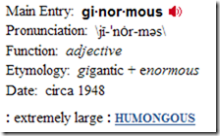 Is anyone else bothered by “ginormous” being added to the Merriam-Webster dictionary? Last week, the pedantic linguist (or is it “linguistic pedant”?) in me cringed when I heard the news that “ginormous” was among the 100 new words added to the M-W collegiate dictionary.
Is anyone else bothered by “ginormous” being added to the Merriam-Webster dictionary? Last week, the pedantic linguist (or is it “linguistic pedant”?) in me cringed when I heard the news that “ginormous” was among the 100 new words added to the M-W collegiate dictionary.
I mean… are they serious?
Obviously they are and had this to say:
“There will be linguistic conservatives who will turn their nose up at a word like `ginormous,”’ said John Morse, Merriam-Webster’s president. “But it’s become a part of our language. It’s used by professional writers in mainstream publications. It clearly has staying power.”
Okay, perhaps I’m a “linguistic conservative” but I think my major issue is that “ginormous” just sounds stupid! The article goes on:
Visitors to the Springfield-based dictionary publisher’s Web site picked “ginormous” as their favorite word that’s not in the dictionary in 2005, and Merriam-Webster editors have spotted it in countless newspaper and magazine articles since 2000.
That’s essentially the criteria for making it into the collegiate dictionary — if a word shows up often enough in mainstream writing, the editors consider defining it.
Intellectually, I understand. Languages are living things that evolve over time. A good dictionary will attempt to keep pace with the times. So I understand it at that level, but still…. ginormous?
But as editor Jim Lowe puts it: “Nobody has to use `ginormous’ if they don’t want to.”
Yes, you can count me as one of those, too. I have an extremely hard time ever imagining a circumstance in which “ginormous” would leave my lips or be something I wrote.
How about you?
You’re using the dictionary backwards!
Most English dictionaries, including Merriam-Webster, are descriptive: they document the language as it as used, and the criteria for adding an entry is usually a certain number of citations where the word is used in print.
The result is that you might hear or read “ginormous” and not know what it means, and then you could go to the dictionary to look it up. A dictionary that refused to tell you what a word you encountered meant because the word is informal wouldn’t be very useful. (And a 1948 first cite suggests that there’s it’s not going away any time soon.)
And don’t get caught up by the “word not in the dictionary” press releases from M-W — “ginormous” has been in the OED and even Macquarie for years. It just took a while to gain currency in the US, I guess.
Rich,
Hmmm… yes, I see your point. The dictionary does need to be “current” so that people can understand the language *as it is written today*.
Okay, argument withdrawn. 🙂 However, I still don’t like the word and don’t expect to ever use it!
Thanks,
Dan
I was surprised when I learned that ginormous is actually a WORD. I don’t recall seeing it in print, and haven’t heard it uttered by anyone whose language skills I respect.
Oh well, this is progress, eh? What’s next?
I understand adding words to the dictionary so that people can look them up (hey, us “old” people live at urbandictionary.com to decipher leet-speak). BUT, does inclusion in the dictionary not legitimize a word for general, everyday use? Should we allow ginormous to be something more than slang?
Here come the days of resumes with experience lists that include “Assisted with organizing ginormous public events.”
We need a separate “slang” dictionary.
I don’t often use “ginormous” but I sometimes say/write “hugenormous” for comic effect.
I’ve used “ginormous,” but always in jest, and usually in casual e-mail or in-person conversation. Much the same way I employ “thingy.”
I found these two Letters to the Editor in the Globe and Mail quite amusing; hope you do, too. (Still available online.)
Repetitively redundant
Bill Kummer
Print Edition 14/07/07 Page A22
Editors of the Merriam-Webster dictionary are showing no unscrupulous ”esquivalience” by adding ”ginormous” to their lexicon (Dictionary Makes Ginormous Discovery – Life, July 12). Portmanteau words are commonly blends of two words otherwise not closely related, such as ”slithy” and ”cyborg.” Ginormous is thus repetitively redundant and unnecessarily superfluous.
How big?
Tom Cmajdalka
Print Edition 16/07/07 Page A12
Letter writer Bill Kummer (Repetitively Redundant – July 14) says, ”Ginormous is thus repetitively redundant and unnecessarily superfluous.” Not so. Any schoolyard denizen will tell you that ginormous is bigger than gigantic and bigger than enormous. In fact, ginormous is exactly as big as gigantic and enormous put together.
🙂
P.S. I checked dictionary.com and so far there is only one citation.
I understand all the reasons for including the word in the dictionary, but I don’t like it either! I love the phrase “portmanteau words,” though.
If they are going to add it, it should be listed as slang.
I hate this word! I’ve been ranting on about it for a few years now. It’s always annoyed me greatly, I’m happy too see I’m not alone at least.
how long before we see words like ‘bestest’, ‘lol’, ‘drawded’ or …..’writed’ (not copy-writed). I’ve seen people say ”I’ve writed a letter”…
I’ll never be happy hearing people say…..Ginormous…
I hate this “word”!!! I lost a bet with my son that it was in MW’s dictionary. Couldn’t believe it. There’s a current radio ad that has a full-grown man use it and it sounds asinine to me.